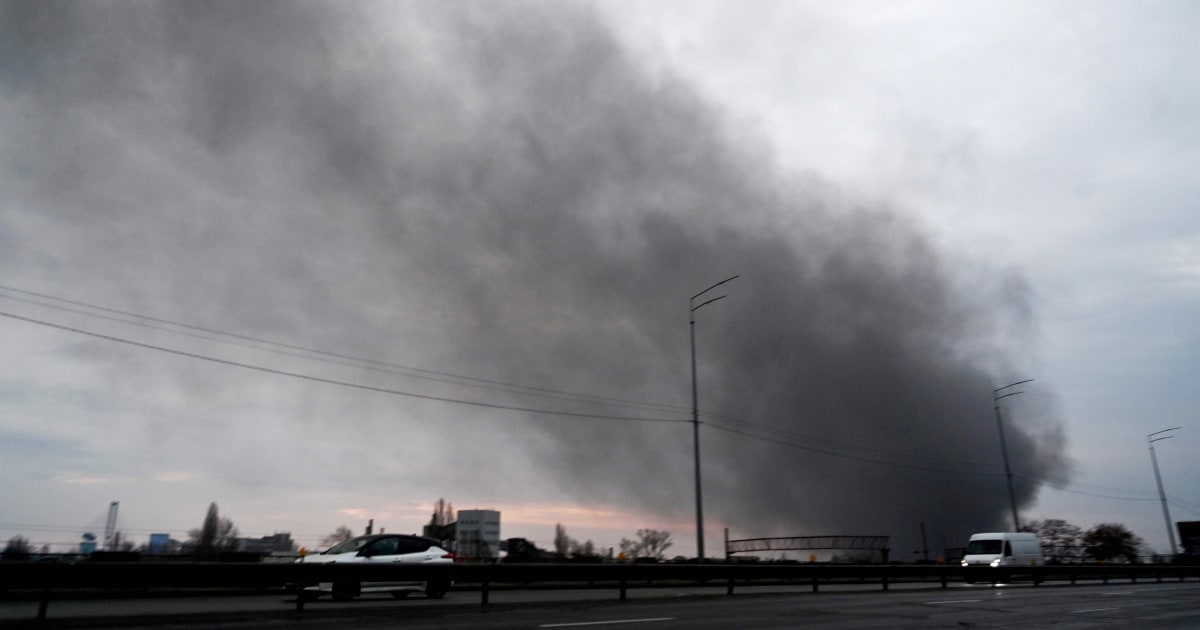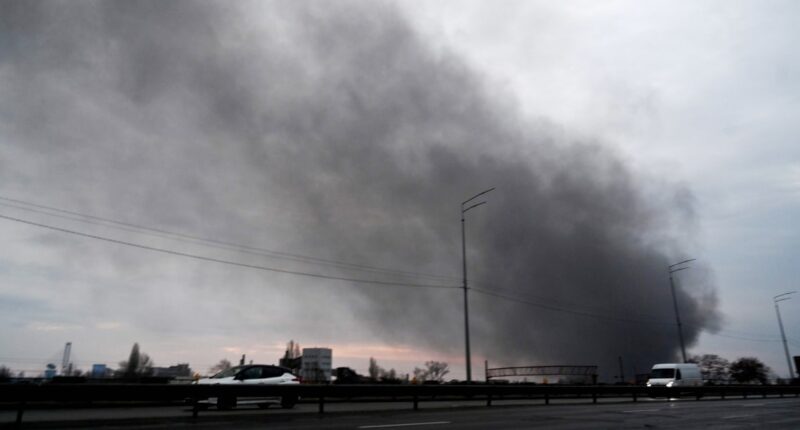
Overall, Russia launched 81 missiles and eight exploding Shahed drones, according to Ukraine’s Chief Commander of the Armed Forces Valerii Zaluzhnyi. Thirty-four cruise missiles were intercepted, as were four drones, he said.
Kyiv’s city administration said the capital was attacked with both missiles and exploding drones. Many were intercepted but its energy infrastructure was hit.
Three people were wounded in Kyiv’s Sviatoshynskyi district, according to Mayor Vitali Klitschko, and several cars on a residential street could be seen burned out in the aftermath of the attack, which also shattered the windows of some apartments.
“We woke up from the explosion, it was very loud and we saw the cars burning,” said Maryna Kuryluk, a 49-year-old resident whose car was among those damaged, possibly from the debris of a missile that had been intercepted.
Klitschko told Germany’s Bild newspaper that defense systems had taken down all but one missile, “which damaged critical infrastructure.”
Smoke could be seen rising from a facility in Kyiv’s Holosiivskyi district and police had cordoned off all roads leading to it.
The alarm in Kyiv was lifted just before 8 a.m., with the air raid sirens falling silent after some seven hours.
The missile barrage struck as Russia pushed its advance in Ukraine’s eastern stronghold of Bakhmut, where a grinding fight between the two sides has gone on for six months and reduced the city to a smoldering wasteland.
It also came hours after U.N. Secretary-General Antonio Guterres visited Kyiv for talks with President Volodymyr Zelenskyy on extending an agreement that allows Ukraine to ship grain from its Black Sea ports and permits Russia to export food and fertilizers.
Private electricity operator DTEK reported that three of its power stations had been hit. There were no casualties, but the company said equipment was severely damaged.
In eastern Ukraine, 15 missiles struck Kharkiv and the outlying northeastern region, hitting residential buildings, according to Kharkiv Gov. Oleh Syniehubov.
“Objects of critical infrastructure are again in the crosshairs of the occupants,” he said in a Telegram post.
Kharkiv Mayor Ihor Terekhov reported on Telegram that there were “problems with electricity” in some parts of the city.
In the south, Odesa Gov. Maksym Marchenko said residential buildings were hit and several power lines were damaged in strikes on his region. He said six missiles and one drone were shot down.
Ukrainian Energy Minister Herman Halushchenko condemned the missile strikes as “another barbaric massive attack on the energy infrastructure of Ukraine,” saying in a Facebook post that facilities in Kyiv, Mykolaiv, Kharkiv, Zaporizhzhia, Odesa, Dnipropetrovsk and Zhytomyr regions had been targeted.
Ukrainian Railways reported power outages in certain areas, with 15 trains delayed up to an hour.
Preventive emergency power cuts were applied in Kyiv, Dnipropetrovsk, Donetsk and Odesa regions, supplier DTEK said. Klitschko said 40% of consumers in Kyiv were without heating because of the emergency power cuts. Water supplies were uninterrupted, he said.
More explosions were reported in the northern city of Chernihiv and the western Lviv region, as well as in the cities of Dnipro, Lutsk and Rivne. Ukrainian media also reported explosions in the western regions of Ivano-Frankivsk and Ternopil.
Russia has been hitting Ukraine with these massive missile attacks since last October. Initially, the barrages targeting the country’s energy infrastructure took place weekly, plunging entire cities into darkness, but they became more spread out over time, with commentators speculating that Moscow may be saving up ammunition.
The last massive barrage took place on Feb. 16.
Source: | This article originally belongs to Nbcnews.com









